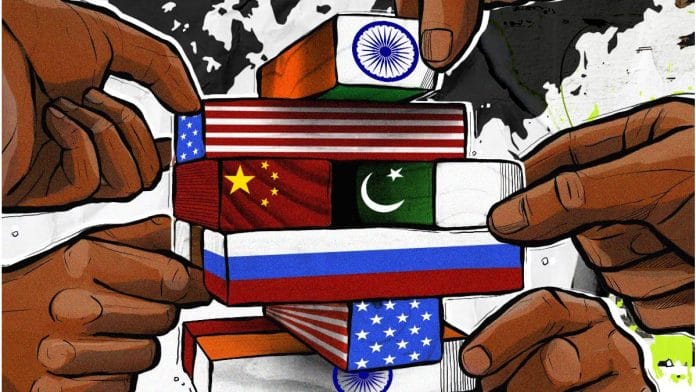New Delhi: South Asian economists—from India, Nepal, Bangladesh, Pakistan, and Sri Lanka—have issued a collective statement after discussing the impact of US President Donald Trump’s tariff, urging the five countries not to get caught up in celebrating each other’s misfortune.
“A slowing world economy will affect all countries, and the current environment is very fluid: circumstances could change overnight for any country, for better or worse. South Asia’s policymakers should be guided by their medium-to long-term interests, and take into cognizance the bigger picture,” read the statement, a copy of which has been shared with ThePrint.
The signatories comprise Sanjay Kathuria, Visiting Senior Fellow, Centre for Social and Economic Progress (CSEP); TG Srinivasan, Senior Visiting Fellow, CSEP; Mustafizur Rahman, Distinguished Fellow, Centre for Policy Dialogue (CPD) in Bangladesh; Paras Kharel, Executive Director, South Asia Watch on Trade, Economics and Environment (SAWTEE) in Nepal; Vaqar Ahmed, Senior Research Fellow, Partnership for Economic Policy (PEP) in Pakistan; and Subhashini Abeysinghe, Research Director, Verité Research in Sri Lanka.
The tariffs have left the global economy uncertain and teetering on the edge. According to the CSEP-Trade Sentinel Tariff Impact Tool, an online platform that analyses the fallout, India’s exports are expected to “suffer significantly”. Meanwhile, Nepal and Pakistan will possibly face “modest gains”, and Bangladesh and Sri Lanka will suffer “export losses”, the statement noted.
Also read: Rupee’s story is not just its exchange rate with the US. It’s about REER—a corrective lens
Reform, trade talks, ‘pivot to Asia’
The economists have put forward four suggestions.
First, the tariffs can be used to create domestic opportunities. India, for instance, has already rejigged the Goods and Services tax (GST), while Pakistan has announced a “forward-looking” New Tariff Policy. However, the economists wrote, there is a lot of work that remains to be done.
Their second policy suggestion calls for “economic pragmatism in a geopolitically tense world”. Essentially, if wielded accurately, trade can be the golden ticket to the entire region’s prosperity.
“It is unfortunate that no serious bilateral, let alone regional, dialogues on trade are taking place in South Asia, the world’s fastest growing region, even as the gap between actual and potential trade continues to widen,” they wrote, adding that trade can be used to catapult the region’s integration into “global value chains”.
Another recommendation is to look inward. “Pivot to Asia,” announces the statement, declaring this the “Asian century”. This is as regions in Asia have taken dramatically different paths. The gap between South East Asia and South Asia has “widened enormously”, and the latter would do well to take a leaf from the former’s book.
“On the western side of the region, integration with Central Asia – a vast, resource-rich hinterland – offers an opportunity to diversify supply chains, secure energy and resource flows, and access new Eurasian markets,” the statement said.
The economists also emphasise the need to double down on multilateral forums like the World Trade Organisation (WTO), stressing that a “collective approach” is what will lead to “effective outcomes”.
(Edited by Prasanna Bachchhav)






